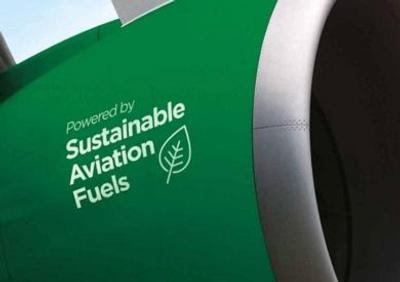Follow the Leader
In a move that underscores the 21st Century compulsion to credulity, major companies—to include Bank of America, Boom Supersonic, Boston Consulting Group, JPMorgan Chase & Co., Meta (Facebook), and clean energy non-profit Rocky Mountain Institute (RMI)—have unified under the auspices of the Sustainable Aviation Buyers Alliance (SABA) to purchase Sustainable Aviation Fuel (SAF) certificates at scale. The confederacy’s departure from the convention of business entities independently purchasing SAF certificates reinforces the perception, if not the reality, that demand for Sustainable Aviation Fuels is on the rise.

SAF, as most pilots and aerospace aficionados know, is a type of ostensibly renewable fuel upon which extant aero-turbine engines are authorized to run provided the SAF is blended at a maximum 1:1 ratio with conventional fossil jet fuel. SAF can be produced from a wide array of renewable feedstocks such as grain crops, agricultural and municipal waste, and used cooking oils. Activists and producers of the stuff allege SAF can lower engine lifecycle greenhouse gas emissions by as much as eighty-percent. That 1,300 gallons of fresh water are required to produce a single gallon of SAF from grain feedstocks is a truism that has yet to spark concern in the minds of the SAF faithful.
Currently, SAF makes up less than 0.1-percent of global jet fuel supply and sells at a premium of three-to-five-times the cost of conventional jet fuel.
The SAF salient in the SABA endeavor is being purchased by member companies via certificates linked to an 850,000 gallons supply, the entirety of which was produced by World Energy—a Boston-based provider of nebulous carbon-net-zero solutions. The fuel will be used to power JetBlue flights throughout 2023.
JetBlue director of sustainability Sara Bogdan stated: "SAF is the most meaningful way we have to decarbonize the aviation industry, but it will take many stakeholders working together to bring the supply and cost of SAF where we need to meet our net zero goals. We're incredibly proud of the SAF commitments we've already made as an organization, but the collaboration and investment by businesses like those within SABA are what will supercharge our transition to SAF by allowing us to increase our offtake while also supporting those businesses' own sustainability goals."
World Energy vice-president of sustainability Adam Klauber remarked: "World Energy is honored to be the fuel producer for SABA's first aggregated SAF purchase. At this pivotal moment SABA plays an important role in addressing aircraft emissions by cultivating trust in SAF and making corporate actions to decarbonize aviation possible.”
SABA member corporations purchasing SAF certificates pay some or all of the difference between the costs of SAF and conventional jet fuel. According to SABA, its certificates afford the nascent SAF market:
- Standardization and transparency for accounting and reporting certified Greenhouse Gas (GHG) reductions
- Essential funding to increase purchases of SAF
- A demand signal by which fuel producers will be compelled to synthesize larger volumes of SAF, thereby stimulating cost-competitiveness with conventional fossil jet fuels.
SABA, the members of which include several of the world’s most recognized and prosperous business entities, was formed by the Environmental Defense Fund (EDF) and the Rocky Mountain Institute (RMI)—the latter being a U.S. organization dedicated to research, publication, consulting, and lecturing in the field of sustainability. By dint of its existence and the economic might of its constituents, SABA seeks to accelerate the aviation sector’s progress toward net zero carbon emissions by fostering a market conducive to credibly scaling investment in the proliferation of SAF.

Following the successful completion of its first joint SAF procurement, SABA is making ready to undertake a second campaign by which the group sets out to procure SAF certificates over a five-year timeframe. The SAF acquired in the second procurement will be offered to all airlines and fuel providers. SABA expects to increase its annual collective demand for SAF by more than ten-times the volume and value of its inaugural effort.
SABA members will also vet a new registry intended to occasion increased transparency, consistency, and integrity within the inchoate SAF certificate market. After the fashion of cults, building trust in a specious system is crucial to convincing future members to go in for ever larger quantities of Kool-Aid, track-suits, or SAF certificates.
SABA’s corporate and nonprofit leaders shared their thoughts pertaining to the organization and its work.
Bank of America global environmental executive Alex Liftman set forth: "Our support and purchase of SAF through SABA is one way in which we are working to meet our goal of utilizing SAF for at least twenty-percent of the company's annual employee aviation fuel usage by 2030, while spurring broader demand to make SAF more accessible and affordable. We are proud to be a leader in the adoption of SAF and look forward to supporting further aviation advancements as part of the bank's $1.5-trillion sustainable finance commitment."
Boston Consulting Group (BCG) chief sustainability officer David Webb enthused: "As part of our commitment to achieving net-zero climate impact by 2030, we are supporting efforts to advance high-integrity sustainable aviation fuels and help to reduce aviation sector emissions. Our participation in this collective purchase agreement is another important step in that journey, contributing to the growing momentum across the market.”
"SABA's SAF registry and first SAF procurement enabled Boom to reduce our corporate travel emissions as part of our journey to net zero carbon by 2025. In addition to supporting our goals, SABA provides pivotal support to scale the SAF industry and decarbonize aviation," said Ben Murphy, vice-president of sustainability at Boom Supersonic—the plane-maker about the ambitious endeavor of designing and producing an eighty-passenger aircraft with a target speed of Mach 1.7 and target range of 4,250-nautical-miles.
Environmental Defense Fund (EDF) senior vice-president energy transition Mark Brownstein parroted: "Achieving a sustainable, zero carbon future for aviation depends on the development and commercial deployment of fuels free from oil, gas, or ecosystem-damaging bio-feedstocks. SABA aims to play an important role in achieving this critical objective, and we're glad to see this important first step in that direction."
Andre de Fontaine, director of sustainability solutions for sustainability consulting & energy management firm ENGIE Impact repeated the mantra, averring: "ENGIE Impact has developed purchasing strategies and individual SAF Requests For Proposals (RFPs) for major companies and well-known brands, but we were honored to design and execute this first collective procurement process. Aggregating demand was a crucial step toward scaling of the SAF market and, ultimately, decarbonizing air travel. We look forward to continuing to collaborate with SABA and bringing this critical Scope 3 emissions abatement tactic to more of our clients as a way of accelerating their progress to Net Zero.”

JPMorgan Chase & Co. managing director and head of operational sustainability Brian DiMarino echoed: "The advancement of innovative technology plays a central role in the transition to a lower-carbon economy. JPMorgan Chase is pleased to be collaborating with SABA partners to further the development of the SAF market and support broader efforts for emissions reductions in the aviation sector."
Meta head of net zero strategy Devon Lake stated: "SAF certificates enable corporate aviation customers like Meta to credibly and transparently contribute to decarbonizing the aviation sector. Buying SAF through SABA's collective procurement process allows us to go one further and send a strong and coordinated demand signal to the market. Basically, if suppliers produce more high-integrity SAF, SABA members will be here to support its uptake.”
Rocky Mountain Institute (RMI) CEO Jon Creyts declared: "RMI is extremely proud to be part of this historic moment. We began working on the concept of SAF certificates and market demand signals in 2019, and this procurement process is in many ways a culmination of that work. We are also putting our money where our mouth is by purchasing SAF certificates alongside SABA members to help address our own travel emissions from flying."
 Aero-News: Quote of the Day (05.09.24)
Aero-News: Quote of the Day (05.09.24) ANN's Daily Aero-Term (05.09.24): Hold Procedure
ANN's Daily Aero-Term (05.09.24): Hold Procedure ANN's Daily Aero-Linx (05.09.24)
ANN's Daily Aero-Linx (05.09.24) Airborne 05.03.24: Advanced Powerplant Solutions, PRA Runway Woes, Drone Racing
Airborne 05.03.24: Advanced Powerplant Solutions, PRA Runway Woes, Drone Racing Airborne-NextGen 05.07.24: AI-Piloted F-16, AgEagle, 1st 2 WorldView Sats
Airborne-NextGen 05.07.24: AI-Piloted F-16, AgEagle, 1st 2 WorldView Sats





